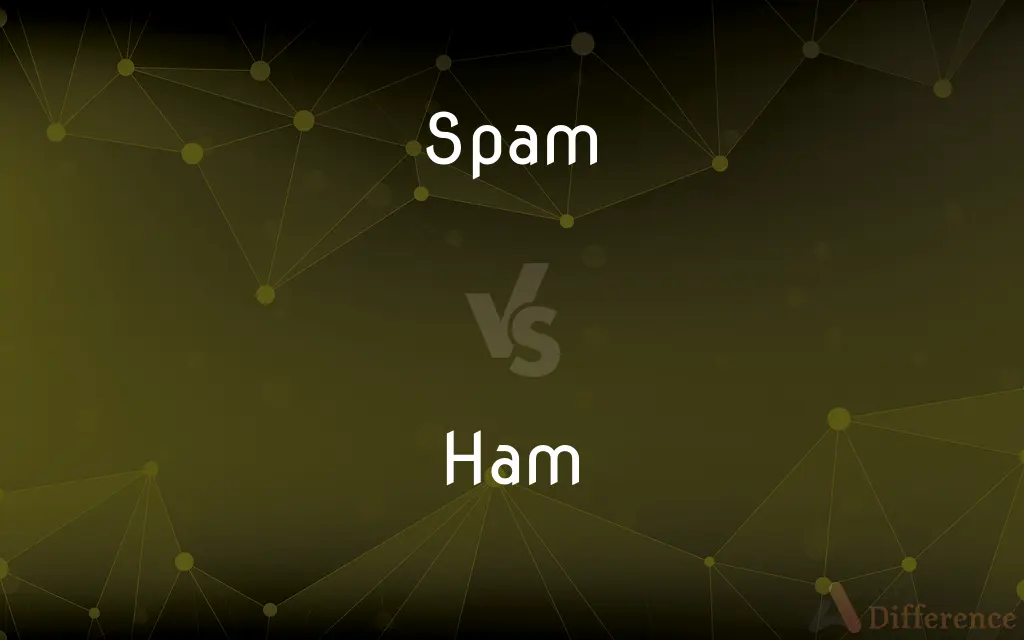Spam vs. Ham — What's the Difference?
By Tayyaba Rehman — Updated on October 16, 2023
"Spam" is unsolicited digital messages, while "Ham" is cured pork from a leg cut.

Difference Between Spam and Ham
Table of Contents
ADVERTISEMENT
Key Differences
"Spam" is commonly understood in the digital realm as any form of unsolicited, often irrelevant or inappropriate messages sent on the Internet to a large number of recipients, typically for advertising purposes. On the other hand, "Ham" refers to a specific type of meat that is prepared from the hind leg of a pig, preserved through salting, smoking, or wet curing.
The term "Spam" comes from a canned precooked meat product but gained its modern meaning from a Monty Python sketch where it's humorously omnipresent, much like unwanted emails or messages. Conversely, "Ham," in its culinary sense, has a straightforward origin, coming from the Old English "hamm" referring to the bend of the knee, indicative of its cut of meat.
"Spam," in the context of electronic communication, can be a serious issue, contributing to inefficiencies by cluttering inboxes and sometimes even posing security risks through phishing or malware. In contrast, "Ham" doesn't possess such negative connotations and is often a cherished component of various cuisines, enjoyed in dishes ranging from breakfast servings to holiday feasts.
Laws against "Spam" have been enforced in many jurisdictions, limiting the nature and volume of unsolicited electronic communications that can be sent. "Ham," however, is regulated differently, with guidelines and standards concerning food safety, animal welfare, and labeling practices set by food safety authorities.
People often use filters to prevent "Spam" from reaching their inboxes, as its pervasive nature can be overwhelming and potentially dangerous. "Ham," in contrast, requires no filtering, unless you're considering dietary restrictions or preferences, and remains a popular food item globally.
ADVERTISEMENT
Comparison Chart
Definition
Unsolicited messages
Cured pork leg
Origin
Brand name, then comedy sketch
Old English "hamm"
Regulations
Anti-spam laws
Food safety standards
Risks
Security, clutter
Health (if consumed in excess)
Reception
Generally unwanted
Often enjoyed
Compare with Definitions
Spam
Any unsolicited message meant to deceive or mislead.
Beware of spam links that look like they're from reputable sites.
Ham
Meat from the hind leg of a pig, often salted, smoked, or cured.
We're having ham for dinner.
Spam
Irrelevant or unsolicited messages sent over the Internet.
My email inbox is full of spam.
Ham
Informal term for an amateur radio operator.
My uncle is a ham, always tinkering with his radio equipment.
Spam
Unwanted digital communication, often of a commercial nature.
I installed a filter to block spam.
Ham
Ham is pork from a leg cut that has been preserved by wet or dry curing, with or without smoking. As a processed meat, the term "ham" includes both whole cuts of meat and ones that have been mechanically formed.
Spam
Precooked canned meat made by Hormel Foods Corporation.
We had sandwiches with Spam for lunch.
Ham
(in the Bible) a son of Noah (Gen. 10:1), traditional ancestor of the Hamites.
Spam
Unsolicited email, often of a commercial nature, sent indiscriminately to multiple mailing lists, individuals, or newsgroups; junk email.
Ham
Overact
She hammed it up for the cameras
Spam
A single piece of such email
"receiving dozens of spams a day" (George Johnson).
Ham
The thigh of the hind leg of certain animals, especially a hog.
Spam
To send unsolicited email to.
Ham
A cut of meat from the thigh of a hog, often cured by salting or smoking.
Spam
To send (a message) indiscriminately to multiple mailing lists, individuals, or newsgroups.
Ham
The back of the knee.
Spam
Unsolicited bulk electronic messages.
I get far too much spam.
I received 58 spams yesterday.
Ham
The back of the thigh.
Spam
Any undesired electronic content automatically generated for commercial purposes.
Ham
Hams The buttocks.
Spam
Ellipsis of spam account
Ham
A performer who overacts or exaggerates.
Spam
A type of tinned meat made mainly from ham.
Ham
A licensed amateur radio operator.
Spam
To send spam (i.e. unsolicited electronic messages.)
Ham
To exaggerate or overdo a dramatic role; overact.
Spam
To send spam (i.e. unsolicited electronic messages) to a person or entity.
Ham
To exaggerate or overdo (a dramatic role, for example).
Spam
To do something rapidly and repeatedly.
Stop spamming that special attack!
Spam this button to get a speed boost.
Ham
(anatomy) The region back of the knee joint; the popliteal space; the hock.
Spam
To post the same text repeatedly with disruptive effect; to flood.
Ham
(countable) A thigh and buttock of an animal slaughtered for meat.
Spam
A canned meat made largely from pork
Ham
(uncountable) Meat from the thigh of a hog cured for food.
A little piece of ham for the cat
Spam
Unwanted e-mail (usually of a commercial nature sent out in bulk)
Ham
The back of the thigh.
Spam
Send unwanted or junk e-mail
Ham
Electronic mail that is wanted; mail that is not spam or junk mail.
Spam
Electronic junk mail or junk newsgroup postings.
That offer is definitely spam.
Ham
Obsolete form of home
Ham
(acting) An overacting or amateurish performer; an actor with an especially showy or exaggerated style.
Ham
(radio) An amateur radio operator.
Ham
(acting) To overact; to act with exaggerated emotions.
Ham
Home.
Ham
The region back of the knee joint; the popliteal space; the hock.
Ham
The thigh of any animal; especially, the thigh of a hog cured by salting and smoking.
A plentiful lack of wit, together with most weak hams.
Ham
A person who performs in a showy or exaggerated style; - used especially of actors. Also used attributively, as, a ham actor.
Ham
The licensed operator of an amateur radio station.
Ham
To act with exaggerated voice and gestures; to overact.
Ham
Meat cut from the thigh of a hog (usually smoked)
Ham
(Old Testament) son of Noah
Ham
A licensed amateur radio operator
Ham
An unskilled actor who overacts
Ham
Exaggerate one's acting
Ham
Pork leg that has been preserved through drying, smoking, or wet curing.
The recipe calls for smoked ham.
Ham
A cut of pork from the thigh of the hind leg.
She bought a ham for the holiday feast.
Ham
A performer who overacts or exaggerates their performance.
He's such a ham when he's on stage!
Common Curiosities
Can "Spam" be dangerous?
Yes, digital "Spam" can contain malware or phishing attempts; "Spam" the food is safe when prepared properly.
Does "Ham" relate to any digital terms like "Spam"?
No, "Ham" doesn't have a digital meaning; it's primarily known as a type of meat.
How do I stop "Spam"?
Use email filters, report "Spam," and don't disclose your email carelessly.
Do "Spam" filters affect legitimate emails?
They can; legitimate emails marked as "Ham" can sometimes be filtered as "Spam" by mistake.
Can "Ham" be eaten raw?
No, "Ham" needs to be properly cooked or cured for consumption.
Is "Spam" always a negative term?
Yes, in digital communication, "Spam" is unwanted, but as a food product, its reception varies.
Is "Ham" unhealthy?
"Ham" can be high in sodium and fats; moderation is key.
How is "Ham" typically served?
"Ham" is versatile, served in various dishes, often smoked, baked, or glazed.
Why is "Spam" called "Spam"?
The term came from a canned meat product and was popularized as a term for junk messages by a Monty Python sketch.
Is "Spam" illegal?
Unsolicited "Spam" is illegal in many places under specific conditions.
Are there different types of "Ham"?
Yes, including country, honey, and black forest, differing in preparation and flavor.
What's the difference between "Spam" and "Ham" in email filtering?
"Spam" refers to junk emails, while "Ham" is used to denote legitimate messages.
What's the origin of "Ham" the food term?
It comes from Old English "hamm," referring to a bend of the knee.
Can you get "Spam" on social media?
Yes, "Spam" can come as unwanted comments, messages, or friend requests.
Is "Ham" only pork?
Traditionally, yes, though there are alternatives like "turkey ham."
Share Your Discovery

Previous Comparison
Mostly vs. Predominantly
Next Comparison
Follower vs. DiscipleAuthor Spotlight
Written by
Tayyaba RehmanTayyaba Rehman is a distinguished writer, currently serving as a primary contributor to askdifference.com. As a researcher in semantics and etymology, Tayyaba's passion for the complexity of languages and their distinctions has found a perfect home on the platform. Tayyaba delves into the intricacies of language, distinguishing between commonly confused words and phrases, thereby providing clarity for readers worldwide.















































